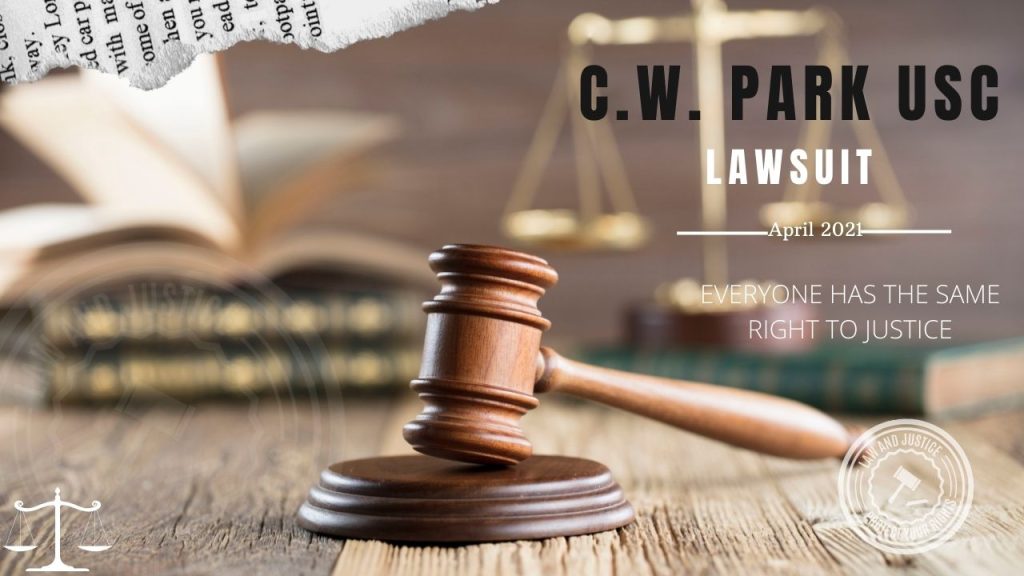In recent years, the issue of discrimination and retaliation in the workplace has gained significant attention and sparked numerous legal battles. One such case that has made headlines is the lawsuit filed by Dr. C.W. Park against the University of Southern California (USC). The renowned marketing professor at USC’s Marshall School of Business alleged that he faced discrimination and retaliation for speaking out against the university’s unethical practices. This blog post aims to provide an in-depth overview of the C.W. Park usc lawsuit, including its background, key developments, and potential implications.
Background Information on C.W. Park’s Case Against USC
Dr. C.W. Park joined USC’s faculty in 1989 and quickly rose to prominence as a leading scholar in the field of marketing. He served as the director of the Center for Global Innovation and was awarded the prestigious Robert D. Buzzell Best Paper Award by the Marketing Science Institute. However, his career at USC took a turn when he began to speak out against the university’s unethical practices.
According to Dr. Park’s lawsuit, USC had been engaging in fraudulent activities, such as falsifying data and manipulating rankings, to boost its reputation and attract more funding. As a result, Dr. Park claims that he faced retaliation from the university, including being denied tenure and promotion.
Allegations of Discrimination and Retaliation at the Heart of C.W. Park’s Claim
The core of Dr. Park’s lawsuit against USC revolves around allegations of discrimination and retaliation. In his complaint, he states that he was subjected to a hostile work environment, where he faced constant harassment and intimidation from his colleagues and superiors. He also alleges that USC denied him resources and opportunities for professional development.
Furthermore, Dr. Park claims that he was denied tenure and promotion due to his outspokenness against the university’s unethical practices. He argues that this decision was not based on his qualifications or performance, but rather a form of retaliation for speaking out against USC’s wrongdoing.
Impact of the Lawsuit on USC’s Research Enterprise and Reputation
The C.W. park usc lawsuit has had significant implications for the university’s research enterprise and reputation. As one of the top-ranked business schools in the country, USC’s reputation has been tarnished by the allegations of fraud and discrimination. The c.w. park usc lawsuit has also brought to light the university’s questionable practices, which may have a long-lasting impact on its ability to attract top faculty and students.
Moreover, the lawsuit has raised concerns about the integrity of USC’s research, particularly in the field of marketing. With allegations of data manipulation and falsification, many are questioning the validity of research conducted at USC and its impact on the academic community.
Legal Issues and Complexities Surrounding the C.W. Park vs. USC Lawsuit
The C.W. Park vs. USC lawsuit is a complex legal battle that involves multiple parties and issues. One of the key legal issues in this case is whether USC violated Dr. Park’s rights under Title VII of the Civil Rights Act of 1964, which prohibits discrimination based on race, color, religion, sex, and national origin.
Another legal issue at play is the concept of academic freedom. USC argues that its decision to deny Dr. Park tenure and promotion was based on legitimate academic reasons and not retaliation. The university maintains that it has the right to make decisions regarding faculty tenure and promotion without interference from outside parties.
Timeline of Events and Key Developments in the C.W. Park Lawsuit
The C.W. Park usc lawsuit has been ongoing for several years, with numerous developments and legal battles. Here is a timeline of key events in the case:
- 2015: Dr. Park files a complaint with the Equal Employment Opportunity Commission (EEOC) alleging discrimination and retaliation by USC.
- 2016: The EEOC finds reasonable cause to believe that USC violated Title VII in its treatment of Dr. Park.
- 2017: Dr. Park files a federal c.w. park usc lawsuit against USC, seeking damages for discrimination and retaliation.
- 2018: USC files a motion to dismiss the case, arguing that the court does not have jurisdiction over the matter.
- 2019: The court denies USC’s motion to dismiss, allowing the case to proceed.
- 2020: USC files an appeal to the Ninth Circuit Court of Appeals, challenging the lower court’s decision.
As of now, the case is still ongoing, and it remains to be seen how it will be resolved.
Implications of the Case for Academic Freedom and Institutional Governance
The C.W. Park vs. USC lawsuit raises important questions about academic freedom and institutional governance. Academic freedom is the principle that protects the rights of faculty members to speak freely on matters related to their research and teaching without fear of retaliation. In this case, Dr. Park argues that his academic freedom was violated when USC retaliated against him for speaking out against the university’s fraudulent practices.
Moreover, the case also highlights issues of institutional governance at USC. With allegations of fraud and discrimination, many are questioning the university’s leadership and decision-making processes. The outcome of this case could have significant implications for how universities handle issues of academic freedom and institutional governance in the future.
Responses from USC and the Faculty Member to the Discrimination Claims
USC has denied all allegations of discrimination and retaliation made by Dr. Park. The university maintains that its decision to deny him tenure and promotion was based on legitimate academic reasons and not retaliation.
On the other hand, Dr. Park’s legal team has presented evidence to support his claims of discrimination and retaliation. They argue that USC’s actions were motivated by racial bias and that the university failed to provide a fair and unbiased review of Dr. Park’s qualifications for tenure and promotion.
Potential Outcomes and Possible Resolutions for the C.W. Park and USC Dispute
The C.W. Park vs. USC lawsuit is still ongoing, and there are several potential outcomes and possible resolutions for the dispute. One possible outcome is that the Ninth Circuit Court of Appeals upholds the lower court’s decision, allowing the case to proceed to trial.
Another possible resolution is that USC and c.w. park usc lawsuit reach a settlement agreement before the case goes to trial. This would involve both parties coming to an agreement on the terms of the settlement, which could include financial compensation for damages and changes to USC’s policies and procedures.
Significance of the C.W. Park Lawsuit in the Context of Workplace Equality and Justice
The C.W. Park vs. USC lawsuit holds significant importance in the context of workplace equality and justice. The case sheds light on the prevalence of discrimination and retaliation in the workplace, particularly in the academic setting. It also highlights the challenges faced by individuals who speak out against unethical practices and the need for stronger protections for whistleblowers.
Moreover, the case serves as a reminder of the importance of diversity and inclusion in the workplace. By bringing attention to issues of racial bias and discrimination, the c.w. park usc lawsuit has sparked important conversations about creating a more equitable and just work environment for all individuals.
Conclusion
The C.W. Park vs. USC lawsuit is a complex legal battle that has far-reaching implications for the university’s research enterprise, reputation, and academic freedom. The case highlights issues of discrimination and retaliation in the workplace and raises questions about institutional governance and decision-making processes. As the case continues to unfold, it will be closely watched by the academic community and could have a lasting impact on how universities handle issues of workplace equality and justice.


